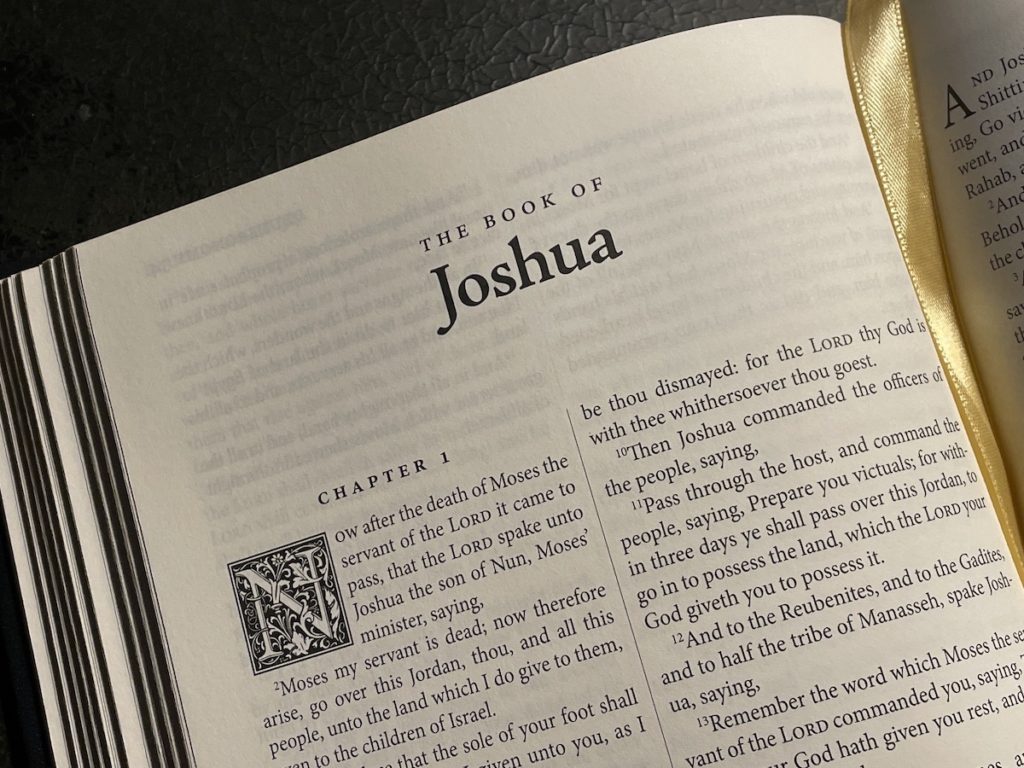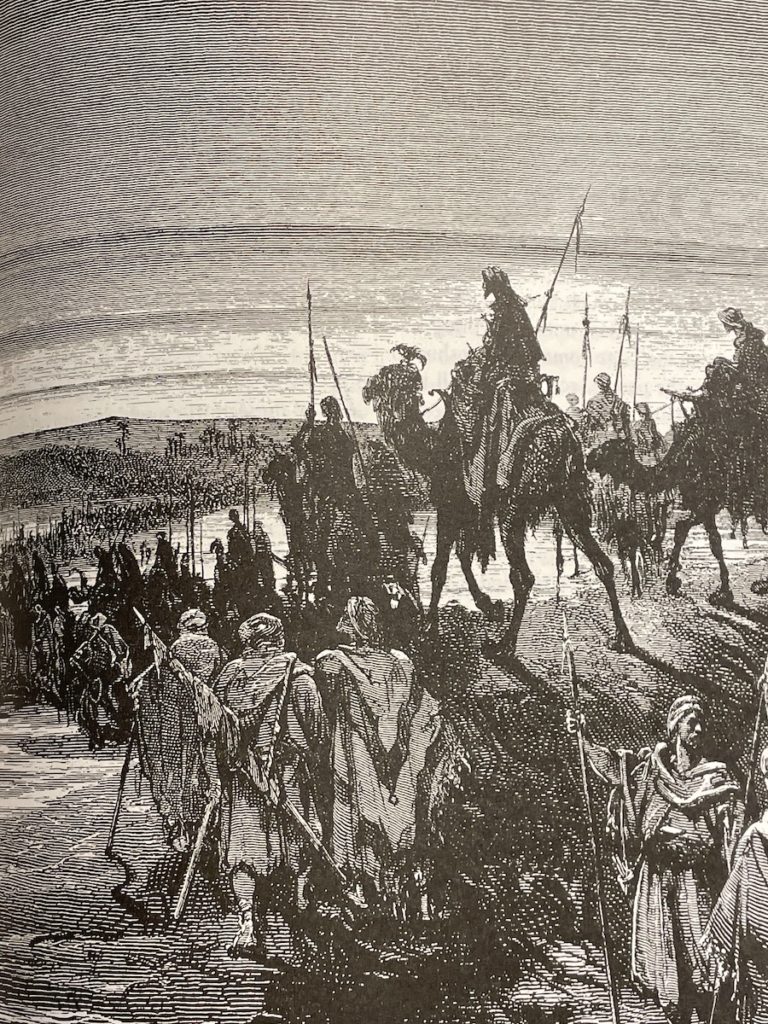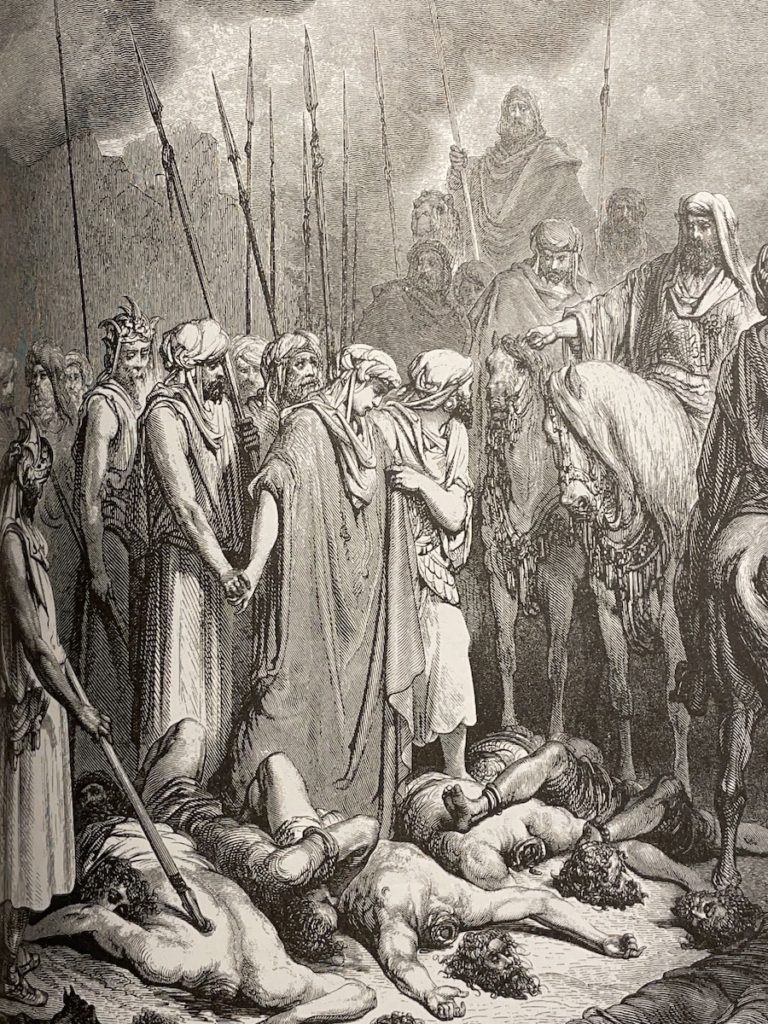
Joshua 1
Joshua 1:21–18, A New Leader; A New Beginning
The children of Israel have come to the end of their forty year wilderness journey. Now YHVH’s people must go forward in possessing the land and the inheritance that he has for them. This is a new beginning for the Israelites. They must go forth and carry with them into the Promised Land YHVH’s teachings or instructions in righteousness—the Torah—as well as the lessons they have learned in their wilderness experience. This principle applies to us as much as it did to the ancient Israelites, for as Paul said, “these things happened to them for examples [or types] and they are written for our admonition upon whom the ends of the world [or ages] are come” (1 Cor 10:11).

The saga of YHVH dealing with Israel did not end with the death of Moses. Similarly, the life of a believer does not start and end at the work of Yeshua at his first coming (whom Moses foreshadowed, see Deut 18:15–18). No, as the death of Moses signaled a new beginning for Israel, so Yeshua’s death on the cross marks a new beginning for redeemed believers as they make their way into their spiritual Promised Land. As Joshua (in Hebrew, Yehoshua meaning “YHVH saves”) led Israel into their physical Promised Land, so Yeshua (the Hebrew word for salvation) at his second coming will lead the saints into the “Promised Land” of his millennial kingdom, and then eventually into the spiritual kingdom of the New Heaven and Earth and the New Jerusalem 1000 years later. Read Hebrews chapters three and four for insights and understanding into how Moses and Joshua were prophetic shadow pictures of Yeshua at his two advents.
Joshua 1:1, Joshua … Moses’ servant. For how long was Joshua Moses’ servant before he became the leader of Israel? What does this teach us about YHVH’s discipleship program? How many other servants of YHVH’s does Scripture reveal spent years in training for the ultimate mission YHVH had for them as leaders of his people? How long was Joseph, Moses, Samuel, David, the disciples of Yeshua and Paul in training, to name a few, before YHVH was ready to use them for his special purposes? As Matthew Henry says in his commentary on this verse, “Those are fittest to rule, who have learned to obey.”
Joshua 1:6, 7, 9, 18, Be strong and of a good courage. Four times in the first chapter YHVH encourages the Israelites with this phrase. Why the fourfold repetition of this admonition at this juncture in Israel’s sojourn? Be strong is the Hebrew word chazak/קזח meaning “to strengthen, prevail, harden, be strong, become strong, be courageous, be firm, grow firm, and be resolute.”According to The Theological Wordbook of the Old Testament, the majority of times chazak is used in Scripture it refers to “being strong in battle.”This word can also mean “to harden one’s heart”against YHVH’s purposes as was the case with Pharaoh twelve times between Exodus chapters 4 and 14. Good courage is the Hebrew word amats/ץמא meaning “to be strong, alert, courageous, brave, stout, bold, solid, hard.”The aspect of this word that means “to harden one’s heart” can have both a good and bad connotation. One can harden or secure one’s heart with the resolve to obey YHVH, or contrariwise, choose to disobey him with an obstinate heart as well. Examples in Scripture where amats is used in the negative sense are Deuteronomy 2:30 and Amos 2:14. These two words, chazak and amats almost appear to be synonyms. Why would YHVH use two words with only slight variation in meaning in admonishing the Israelites as they were about to enter the Promised Land? Was he trying to emphasize a point? Perhaps he anticipated that eventually they would grow faint and weary battling the onslaught of evil around them and succumb to the influences of the surrounding pagan nations leading to their apostasy. Perhaps the writer of the Epistle to the Hebrews had these two Hebrew words in mind when he wrote the following:
12 Take heed, brethren, lest there be in any of you an evil heart of unbelief, in departing from the living Elohim. 13 But exhort one another daily, while it is called today; lest any of you be hardened through the deceitfulness of sin. 14 For we are made partakers of Messiah, if we hold the beginning of our confidence steadfast unto the end; 15 While it is said, “Today if you will hear his voice, harden not your hearts, as in the provocation.” 16 For some, when they had heard, did provoke: howbeit not all that came out of Egypt by Moses. 17 But with whom was he grieved forty years? Was it not with them that had sinned, whose carcasses fell in the wilderness? 18 And to whom swore he that they should not enter into his rest, but to them that believed not? 19 So we see that they could not enter in because of unbelief. (Heb 3:12–19)

What can we learn from our ancient forefathers in this regard as we face the challenges of remaining faithful to YHVH in the midst of a crooked and perverse generation?
Joshua 1:8, Make your way prosperous…you shall have good [Heb. sakal] success.The expanded meaning of the word prosperous is literally “to press through, to break out”or “to accomplish satisfactorily what is intended” (according to The Theological Wordbook of the Old Testament). The TWOT continues, “Real prosperity results from the work of God in the life of one who seeks God with all his heart (2 Chr 31:21; Ps 1:3, vol. 2, p. 766). The word success literally means “understanding, prudence, good sense, insight, prosperity.” An alternate rendering of this last phrase of Joshua 1:8 reads, “Make your way successful, and then you will act wisely” (The ArtScroll Stone Edition Tanach).
But how is that prosperity and success achieved? The answer is to be found in the first part of verse eight where four keys to success are given. They are:
- The Torah (or the Word of Elohim) shall not depart from your mouth.
- You shall meditate on it day and night.
- Observe all that the Word of Elohim contains. The Hebrew word for observe is shamar meaning “to hedge about, to guard and to protect.”
- Do all that the Word of Elohim contains.
Now it is time to evaluate your life to see if you are on the road to success or not.
Good success [Heb. sakal]. If there is good success, then it stands to reason that there is bad success. One can gain success through nefarious and ungodly means. One can also gain success through good means, but that success leads them away from YHVH. These are examples of bad success. The world tends to judges a book by its cover. If a person is successful or prosperous, then they must be a good person and blessed of YHVH and vice versa. This was the opinion of Job’s three wicked friends. It is this erroneous concept that Yeshua is countering in his Parable of Lazarus and the Rich Man. Neither material success nor poverty are a good judge of a person’s character. In the eyes of YHVH, good character is the determiner of true success. This is the meaning behind the Hebrew word for success in this verse.
Joshua 1:17, According as we hearkened unto Moses in all things, so will we hearken unto you.What is the irony of their statement? In reading in the Torah’s accounts of Israel’s murmuring, rebellion and stiff-neckness, it is a wonder that the Israelites could make such a statement with a straight face! What does such a statement reveal about the condition of the human heart and its proclivity toward self-deception, self-justification, and self-righteousness? (Read Jer 17:9; Prov 16:2 and 21:2.) What do you think the spiritual link is between Israel’s statement above and their statement in the last phrase of verse 17 where they referred to YHVH as “your [i.e., Joshua’s] Elohim” instead of “our Elohim”? Does this statement reveal some major flaw in their character and their spiritual and personal commitment and devotion to YHVH?
Joshua 1:18, What was Joshua’s response to Israel’s self-delusional and self justificational statement of verse 17? Do you think Joshua was fooled for one minute by what they said? Why do you suppose his answer reflected such a hard-line approach?
Joshua 2
Joshua 2:4–5, So she said. Rahab lied to save the lives of the two spies, even as the Hebrew midwives lied to the Egyptians to Pharaoh to save the lives of the Hebrew children (Exod 1:19) and YHVH blessed them for it (Exod 1:20–21). What this teaches us is that though lying is a sin, it is a greater sin to take the life of a person. In rare instances and for the greater good, a lesser sin may need to be committed in order to prevent a great sin from occurring. The same is true of working on the Sabbath as in the need to rescue an ox out of a ditch to prevent the death of an innocent animal. Emergencies happen, sometimes even on the Sabbath necessitating that work be done.
Joshua 2:21, Scarlet cord. Scarlet thread is like the lambs’ blood on the Israelite’s doorposts offering protection to all within the house from Elohim’s judgments of wrath upon the wicked Egyptians. Rahab’s house is was an “ark” of safety to those who believed in the Elohim of Israel. The scarlet thread is like the Elohim’s seal or mark on the head of the redeemed saints in the last days who are saved out of the great tribulation and are made clean by the blood of the Lamb (Rev 7:14). Perhaps the two spies prophetically represent the two houses of Israel in the end times, or the two witnesses who witness YHVH’s truth to an unbelieving generation just prior to Yeshua’s return and leading his saints into the Promised Land, just as Joshua was about to do. Rahab came out of the world in response to the testimony of the two spies, and was able to escape the judgments of Elohim on her city because of the scarlet cord. Similarly, the sealed saints will escape YHVH’s end times wrath because of the blood of Yeshua.
Joshua 2:1–24, YHVH Rewards the Faith of a Non-Israelite Gentile
The obvious connection between this week’s Parashah and Haftorah portions is the sending forth of spies to scope out the land of Canaan. The first mission ended in a calamitous disaster for Israel based on the faithlessness of the ten spies, while the second mission resulted in Israel successfully conquering Jericho, the fortified gateway city to the Promised Land.
Joshua 2:1, Rahab. Rahab, the non-Israelite innkeeper and inhabitant of Jericho, was a woman of faith who became a sincere convert to the Israelites’ religion, and ended up becoming an ancestor of David and Yeshua. Throughout Scripture, there are examples of righteous non-Israelites confessing their faith in the Elohim of Israel, choosing to leave behind their pagan cultures and being grafted into the nation of Israel. Who are some other examples of this in Scripture? (See Gen 41:45; Exod 12:38,48–49; Lev 18:26; Num 15:16; Deut 10:19; 31:12; Ruth 1:16.) Rahab was a stranger or alien seeking to be grafted into Israel. What does Scripture say about this class of people?
Stranger (Foreigner or Alien; Heb. nekar). Rahab was a stranger or foreigner to Israel. She is a prophetic picture of Gentiles who come to faith in the Elohim of Israel and are grafted into that nation.

Scripturally the Hebrew word nekar is used in reference to anything or anyone that is foreign to the religion or people of Israel (Exod 12:43; Deut 31:16; 32:16; Judg 10:16; Neh 9:2; Isa 60:10; Ezek 44:7).
Nekar can also refer to people who forsake their foreign or alien ways and join themselves to the people and to Elohim, the God of Israel, and who take hold of the covenants of Israel (Isa 56:3–6; cp. Eph 2:11–14). In Exodus 12:43 and 48, the KJV uses the word stranger, though in each verse they are two different Hebrew words. In the former, the word nekar is used in reference to those who are not allowed to partake in Passover. In the latter verse, the Hebrew word for stranger is ger meaning “a temporary inhabitant, or a newcomer.”
This word is also translated in the KJVas stranger, or alien, but also carries with it the connotation of “a sojourner.” The TWOT defines a ger as follows: “The root means to live among people who are not blood relatives; thus, rather than enjoying native civil rights, the ger was dependent on the hospitality that played an important role in the ancient near east.… The ger in Israel was largely regarded as a proselyte. He was to be present for the solemn reading of the [Torah] Law (Deut 31:12) showing that he was exposed to its demands. The law concerning unleavened bread applied to him as well as the native (Exod 12:19) and a circumcised ger could keep Passover (Exod 12:48f.; Num 9:14).” He was also included in the celebration of the Day of Atonement (Lev 16:29), the Feast of Tabernacles or Booths (Deut 16:14), like the native he was forbidden from worshipping foreign gods (Lev 17:8), and was forbidden from eating blood (Lev 17:10, 12, 13). The laws of sexual chastity applied to him as well as to the native (Lev 18:26) along with the Sabbath laws (Exod 20:10; 23:12). He experienced the same legal and civil rights as a native Israelite (Deut 1:16; 24:17; 27:19) and Israel was to not oppress the ger (Exod 22:21; Deut 10:19) but to love him as themselves (Lev 19:34) (The TWOT, vol. 1, pp. 155–156)
In brief, Israel’s treatment of the ger was a means of evangelizing the world with the message of YHVH’s Torah-truth. All could come into a spiritual relationship with the Elohim of Israel without respect to ethnicity and there was one Torah (i.e. YHVH’s instructions, teachings or precepts in righteousness) for both Israelite and non-Israelite. Indeed, this was the driving force behind Paul’s passion for the Gentiles (or people of the nations).
Realizing the basis of evangelism from the Tanakh and the command to make proselytes by bringing aliens and strangers into the covenants and commonwealth of Israel and into a righteous relationship with the Elohim of Israel may help us to understand Paul’s statements in Ephesians 2:11–19 (cp. 1 Pet 2:8–11).
As we study the concept of the stranger’s relationship to Elohim, to the people and Torah covenants of Israel, it is interesting to note that Scripture nowhere indicates that YHVH would ever make a new or different covenant with the Gentiles or have different standards of righteousness for them than for Israel. Rather, the Gentiles were expected to assimilate into Israel, become Israel, follow the laws of Israel and be treated as Israel. This rule of law for the people of El never changed even through the apostolic age despite what most Christian biblicists teach to the contrary. Remember, YHVH stated clearly that he does not change (Mal 3:6), and Yeshua taught that any religious tradition of men that nullifies the Word of YHVH should be ignored (Mark 7:7–9).
Joshua 2:1, Came to an innkeeper’s house. Psalm 37 says, “Commit your way unto YHVH; trust in him … Rest in YHVH, and wait patiently for him … The steps of a good man are ordered by YHVH, and he [YHVH] delights in his [the man’s] way” (verses 5, 7 and 23). The spies embarked on their mission with hearts of faith in YHVH’s promises intent on bringing back a good report, unlike that of their forefathers. How did YHVH direct their steps, supernaturally protect them and reward their faith? How did he similarly reward Rahab for her faith? This mission has all the earmarks of a divinely inspired and blessed one. Was it by chance that they happened upon this particular innkeeper’s place, that she was a woman of faith, that she would give them valuable information, and that she would become grafted into Israel and become an ancestor of Yeshua? All this occurred because the spies faithfully executed their mission. What can we learn from this about walking by faith and in obedience to the instructions YHVH has given us? The faithlessness of the ten evil spies affected a whole generation of Israelites, while the faith of these two righteous spies effected not only that generation of Israelites, but the salvation of the world through the birth of the Jewish Messiah! What has YHVH called us to do in our spiritual faith walk? Are we being faithful? What kind of legacy will we leave after us?
Joshua 2:18, Line of scarlet thread. Rahab was saved from judgment against the sins of Jericho at the hand of a righteous Elohim by her hanging a scarlet thread out her window. What is the spiritual significance of this—especially in light of the color red? Relate this to what the Israelites did on Passover eve (Exod 12:22). A scarlet or “crimson thread” runs through the pages of Scripture, and is symbolic of Yeshua’s redemptive work pointing the way to the cross (John 19:34). Examples of this “crimson thread” can be found in Genesis 38:28–30; Exodus 25:5; 26:14,36; 35:7; Isaiah 1:18; 1 John 5:6ff. (See also 1 Cor 10:2 cp. Heb 11:29.)
Joshua 4
Joshua 4:19, The tenth day of the first month.This was four days before Passover (see Josh 6:10). What follows in the rest of chapter four and through chapter fiver is YHVH’s people preparing themselves for the solemn appointed time or moed of Passover. When it comes to celebrating all of YHVH feasts, his people need to prepare themselves physically and spiritually for the occasion, so that when they come before him, they are in a proper spiritual state.
Joshua 5
Joshua 5:2, Circumcise the sons of Israel. We are told that circumcision symbolically pictures the putting away of the filth of the flesh (1 Pet 3:21). This ritual was performed on the eighth day, with the number eight signifying new beginnings. Yeshua rose on the first day of the week or the eighth day after the seven day week was complete signifying a new and higher spiritual life at a level above that of the previous seven days on earth. The Israelites coming into the Promised Land as led by Joshua (Heb. Y’hoshea from which the names Yeshua or Jesus originate) prophetically pictures Yeshua leading his redeemed and spiritually regenerated followers into the higher heavenly promised land of the kingdom of Elohim as noted by the author of Hebrews (Heb 4). One cannot enter into the eighth day of YHVH’s eternal kingdom, as pictured by the biblical festival of the Eighth Day (Heb. Shemeni Atzeret)—a picture of the New Jerusalem (Rev 21 and 22), until one has put away the filth of the flesh (one’s carnal nature) and had their hearts circumcised, so that they are now willing and able to do the will of their Father in heaven unlike Adam and Eve who rebelled and turned paradise of this earth into the habitation of rebels and sinners.
Joshua 5:8–9, Circumcising all the people. When the Israelites were circumcised, YHVH “rolled away the reproach (scorn, shame, disgrace) of Egypt” from off the Israelites. Based on this, could it not be said that in YHVH’s eyes, not being circumcised is the reproach of Egypt, since circumcision is the sign of the Abrahamic Covenant indicating that one has a relationship with YHVH and is no longer a Gentile who is one without Elohim and hope (Eph 2:12). Is this what the reproach of Egypt is—to be an Egyptian (or a Gentile) spiritually?
Joshua 5:11, And they ate. As the manna ceased, the Israelites ate the fresh barley grain that had already been growing in the land. In Leviticus 23:14, the Israelites were forbidden to eat of the new barley crop of the land of Israel until the day of the omer offering (or wave sheaf day). This year, the omer offering occurred on the next day after the Passover (Nisan/Abib 14), which was Nisan/Abib 15, or the first day of the Feast of Unleavened Bread. Because the omer offering was to be brought on the morrow or day after the (weekly, see notes at Lev 23:16) Sabbath (Lev 23:11), this means that the Israelite’s first Passover in the land of Israel occurred on a weekly Sabbath, and wave sheaf day occurred on Sunday. This verse also shows us that the morrow after the Sabbath (i.e., wave sheaf day) occurred during the Feast of Unleavened Bread—not before or after it. This should be taken into consideration when determining which weekly Sabbath at the time of Feast of Unleavened Bread should be used to determine wave sheaf day and, hence, the beginning the fifty day omer count leading to the Feast of Weeks or Shavuot (i.e. Pentedcost). This passage indicates the wave sheaf day, not the weekly Sabbath, has to fall within the Feast of Unleavened Bread.
Joshua 5:14, No.This is a curious, indirect answer to Joshua’s questions. What did the Messenger of Elohim mean by it? It can almost be taken to mean that Elohim is not on any person’s side of a conflict. Rather, he is on his own side—the side of truth and righteousness. If our ways line up with his standards of truth and righteousness, then he will be on our side, if not then he will be against, even as the Israelites found out later in their military defeat at Ai.
Joshua 6
Joshua 6:6–7 (also verse 9), Let him that is armed/equipped. YHVH considered the rams horn shofar in the hands of the priests to be a military weapon. Is there a prophetic connection between the seven shofars that brought YHVH’s judgment upon Jericho and he seven trumpets of the book of Revelation that will bring the wrath of YHVH’s judgment upon the earth in the end times?
Joshua 7
Joshua 7:1, Of the tribe of Judah. Some people in Judah (i.e. the Jews) have an inordinate love of money. It was Judah’s idea to sell Joseph to the slave traders for money. Achan was of Judah and coveted Jericho’s gold, and contrary to YH VH’s command, took some gold for himself bringing a curse on Israel. Moreover, in Nehemiah’s day, some rich Jews enslaved their poor brothers for profit sake contrary to Nehemiah’s instructions. Later Judas Iscariot, for 30 shekels of silver money, betrayed Yeshua.
Joshua 7:14, Achan…Achor. Achan means “trouble” and Achor means “trouble, disturbance.” Both words are spelled the same in Hebrew except for the final consonant. The Torah employs the literary devise of a word-play to teach a lesson: Disobedience to YHVH’s commands leads to trouble.
Joshua 7:5, Struck down thirty-six men. One man’s sin in the camp of Israel can adversely affect the whole camp and bring YHVH’s judgment on the camp. Don’t under estimate the negative consequences of one person’s sin especially if it goes against YHVH’s specific instructions for a specific situation as was the case with not taking any precious metals out of Jericho for oneself.

